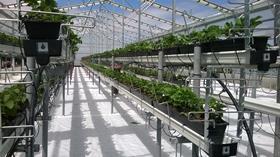
A 'Millenium stadium for strawberries' is how Drew Reynolds, technical director at Total Produce, describes the company’s ongoing strawberry-growing trial at its Kent varietal development site.
The project, which is joint-funded by Marks & Spencer and is believed to be the first of its kind in the UK, measures the effect of a retractable roof and walls on the yield of June-bearing strawberry crops. Made from reinforced plastic and fully automated in response to outside weather conditions, the system is pricier than a tunnel, but less expensive than a glasshouse. The effect? Plants benefit from greater ventilation and light exposure – trays can also be raised or lowered – while the fact it is automated immediately reduces labour costs.
Reynolds explains: “A lot of varietal development is done into ever-bearer plants to produce crops over a long period of time. But the reality is you need a certain yield to make it profitable, and we are trialling the most economic way of doing this.
“The traditional June crop has been extended by cold-storage developments, but every time you extend the season you lose some yield, as usually it would have more time to grow than is allowed in a 60-day cycle. We need to try to understand what level of yield you need to make it profitable in the long term, and maintain the quality.”
Halfway through the two-year project, Reynolds says initial results have shown the system can increase plant yields, while reducing labour costs and chemical input. The trial began using strawberry variety Sonato, but Reynolds says that this year he will start to add in new varieties, as well as continue trials on plant densities and other variables. “When the walls and roof are drawn back, the plant is entirely in the open, leading to better ventilation and light exposure, and consequently, a healthier plant, so another positive is that we’re using less and less chemicals. As soon as you’ve got moisture enclosed in a tunnel your plants may get exposed to disease.
“At the end of the first year we have positive information on yields, and better-quality plants. We are now planning to put more varieties in this year,” he says.
The technology is provided by a Canadian firm and is currently being used on various products in Central America. Reynolds explains how it automatically results in a “significant saving on labour”, by replacing the need to manually open the sides of a glasshouse during the day – a job that is particularly important, and time-consuming, at this time of year when nights are still cold.
In the future, Reynolds would like to try the technology on cherries – as a UK-grown crop set for future growth, he believes this would make a huge difference to current systems that primarily use tunnels. “If we could cover cherries with a large flat roof, which is retractable, this would make a huge difference,” he says, adding that a retractable roof means the landscape would be visible again, which would perhaps aid planning permission or swing public favour towards glasshouse expansions.
“We are pleased that a retailer recognises the importance of sustainability in varietal development,” Reynolds says of M&S’ involvement, as without the retailer’s supportive funding the project would not have been able to go ahead.
“It is rare for a business like us to do this level of work, but we are passionate about creating the best environment for our berries and making them as sustainable as possible.”



